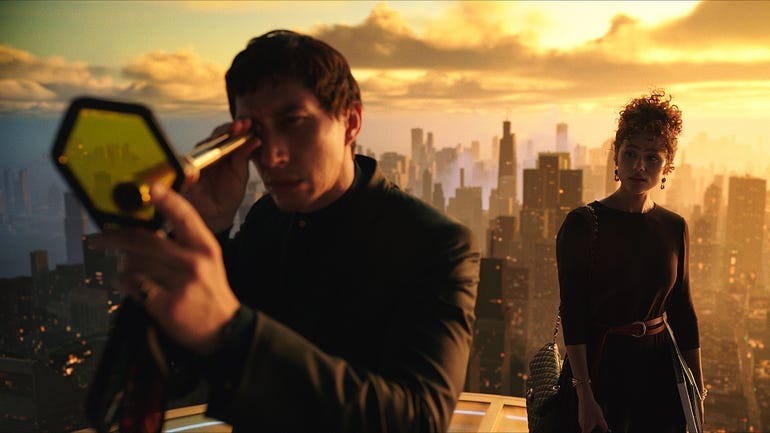Review: Megalopolis
Francis Ford Coppola’s Megalopolis reaches for artistic grandeur but gets lost in its own surreal, bloated ambitions.
Welcome to New Rome, where the rich and corrupt fight for power and prestige while the poor and desperate live off the scraps. This fictional metropolis — part New York, part ancient Rome, with its emperors and senators — is the setting for Francis Ford Coppola’s latest epic, Megalopolis. It’s a story about how humanity’s quest for power and fame turns the pursuit of utopia into dystopia. Oddly enough, it’s also a film about urban planning.
As megalomaniac urban planner Caesar Catilina (played by Adam Driver) so eloquently puts it: “What will destroy humanity is civilization.” These are grand, pretentious themes, and I have a confession to make: Just now, as I wrote “Francis Ford Coppola,” I considered adding “the legendary filmmaker” before his name. But I didn’t. Can you remember the last time you saw a Coppola film? Was it The Godfather (1972)? What about Apocalypse Now (1979)? Maybe Bram Stoker’s Dracula (1992)? All undeniable classics. Or was it something else? Can you name one Coppola film from the last three decades?
They say the best films are made when talented directors are free to work creatively without interference or limitations from studios and investors. And while the film industry has changed a lot since the ’70s, there’s still room for idealists — even in Hollywood. But does every passion project, even from veteran filmmakers, turn to gold on the big screen? If Megalopolis proves anything, it’s that it takes more than blood, sweat, and tears (and $120 million) to make a great movie. This is, after all, a project Coppola has worked on for decades.
The story of New Rome often feels more like an abstract mood piece than a cohesive narrative. Urban planner and playboy Caesar Catilina dreams of utopia. They say time waits for no one, but that’s not true for Caesar Catilina! This artist’s creativity is so powerful that time itself stops, and the laws of physics bend at his will. With a word from Caesar, time halts — a metaphor for the force of creativity, sure, but also a handy trick when designing tomorrow’s utopia. Oh, and there’s Megalon, a super-material that makes any construction project possible.
Not everyone is a fan of Caesar’s power and influence, though. The unpopular mayor, Cicero (Giancarlo Esposito), is a traditionalist in a city constantly pulled toward the future by Caesar. Cicero can tolerate the constant boos and jeers from the crowd wherever he goes in public, but Caesar’s antics are harder to swallow — especially when Cicero’s daughter, investigative journalist Julia Cicero (Nathalie Emmanuel), gets involved with his rival. First professionally, then romantically.
Megalopolis starts strong, with an exciting world inspired by ancient Roman power struggles and hedonism. But it quickly becomes clear that Coppola is more interested in giving us a surreal mood piece than a coherent story. The approach is artistic; the result is a mess.
There’s plenty of strange and unexplained stuff happening over the film’s two-hour-plus runtime. Traditional storytelling and logic? Tossed out the window. Some plotlines build up but lead nowhere, while others pop up out of nowhere. It’s as if Coppola threw a mountain of ideas into the script and forgot half of them during the decades he used to write this thing. We get random montages of images meant to create atmosphere, and there are even occasional musical numbers. By the end, I wouldn’t have been surprised if a UFO had landed in the middle of the street!
While most of the cast seem to struggle to keep up with the surreal narrative, Adam Driver excels as Caesar Catilina. Do we get an explanation for his ability to stop time and bend physics? No, not really. At first, I thought it was subjective — like how artists lose themselves in the “zone.” But when other characters witness him stopping time, the questions start piling up. About 30 minutes in, I realized I wouldn’t be getting any answers. At least none that made any sense.
Besides Adam Driver, there’s not too much to write home about. Giancarlo Esposito is solid, as always, but there’s a lot of overacting from the supporting cast. I didn’t quite buy Nathalie Emmanuel as Julia Cicero, and Shia LaBeouf as the wild hedonist Clodio Pulcher felt miscast. Jon Voight even popped up as the power-hungry Hamilton Crassus III, which was a nice surprise, I guess — especially as I thought the man was either retired or dead.
Megalopolis isn’t a good film. It trades basic storytelling for abstract ideas and concepts that fall over each other into a tumbled heap at the end. It’s either so deep that only Coppola understands it or so simplistic that you find yourself searching for meaning where there is none. Neither approach is ideal for connecting with a broader audience, something this film also failed to do.




